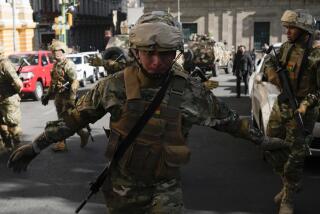Efforts to Resolve Fiji Crisis Fail
- Share via
SUVA, Fiji — A coup leader who is holding Fiji’s prime minister and most of his Cabinet hostage rejected today the government’s latest, desperate efforts to end the crisis, but he said his negotiations with the country’s leadership were making progress.
George Speight issued his comments through a spokesman after President Ratu Sir Kamisese Mara announced that he was firing his captive prime minister, Mahendra Chaudhry, and disbanding Parliament in a last-ditch effort to appease Speight, a businessman and self-styled “crusader” for indigenous Fijians.
The president also said he was “highly likely” to grant Speight and his top lieutenants immunity.
Mara’s moves appeared to ensure that Speight would accomplish much of what he set out to do when he and a group of gunmen stormed Parliament on May 19, tied up Chaudhry and his top leadership and issued a list of demands designed to end Chaudhry’s government.
Chaudhry and about 30 other hostages remained confined today inside the Parliament compound, whose palm-lined gardens and grassy plazas have become a carnival-like encampment of hundreds--at times thousands--of mostly impoverished native Fijians who have claimed Speight as their leader.
The crisis has paralyzed the capital, Suva, and sharply reduced the flow of tourists to the Fijian islands, more than 3,000 miles southwest of Hawaii.
The standoff had been largely free of violence until Saturday, when shots were fired during a confrontation between Speight followers and soldiers maintaining a roadblock outside the parliamentary compound. Two soldiers and a British cameraman working for Associated Press Television News were injured.
The military announced today that it was turning over maintenance of the roadblocks to unarmed police--another victory for Speight.
In the president’s announcement, delivered from his colonial-era palace on a hill overlooking the sea, Mara appeared to give in on all but two key points: his own resignation and the recognition of Speight as head of a new government.
A spokesman for Speight, Jo Nata, said the president’s announcement would not end the crisis. “Our request has not been given due consideration,” he said on state TV.
However, Speight also issued a statement saying negotiations with a delegation of influential tribal chiefs were making progress.
At the heart of the crisis is a rift between indigenous Fijians and ethnic Indians, who were brought to the former British colony a century ago to work in the sugar cane fields as indentured servants. The Indians stayed and ultimately prospered, and their descendants now dominate the Fijian economy.
The resulting economic imbalance has helped nurture a nationalist movement among indigenous Fijians, who have called for the ethnic Indians to be excluded from political power and, in the most extreme manifestations, have called for them to be repatriated to India, a country few of the ethnic Indians have ever even visited.
Chaudhry was the nation’s first prime minister of Indian descent, a matter of great pride to the 44% of the population who claim Indian ancestry but a rallying point for the Fijian nationalists. In response to their demands, Mara agreed last week to amend the constitution to bar ethnic Indians from top positions in government--a prohibition that had existed until three years ago.
Mara conceded Saturday that his sweeping concessions to the hostage-takers were placing Fiji on “the worst end of the pariah list of governments. We all understand that. Sorry, but that’s the price we have to pay.”
He said he saw no alternative to his actions, which relied on a complex chain of parliamentary maneuvers. Mara said he had named a new prime minister, Labor Minister Tevita Momeodonu, who took steps to dissolve the Parliament and then resigned within a matter of minutes, leaving the president as the sole governing authority until a caretaker government could be appointed, probably by Monday.
Mara would not say who would be named acting prime minister but ruled out Speight, saying he was not constitutionally qualified because he had not been elected to Parliament. Mara also said he felt an obligation to remain as president and would not resign “under the present circumstances.”
Mara has come under considerable international pressure to stand up to Speight. The U.S., along with Fiji’s two most important trading partners, Australia and New Zealand, all have threatened economic sanctions if the crisis is not resolved constitutionally. But Mara has said his first concern is resolving the crisis peacefully.
The president conceded that his response, while technically constitutional, might still unleash sanctions and seriously damage the economy.
“We are going to face not only purgatory but hell politically,” he said.
More to Read
Sign up for Essential California
The most important California stories and recommendations in your inbox every morning.
You may occasionally receive promotional content from the Los Angeles Times.













